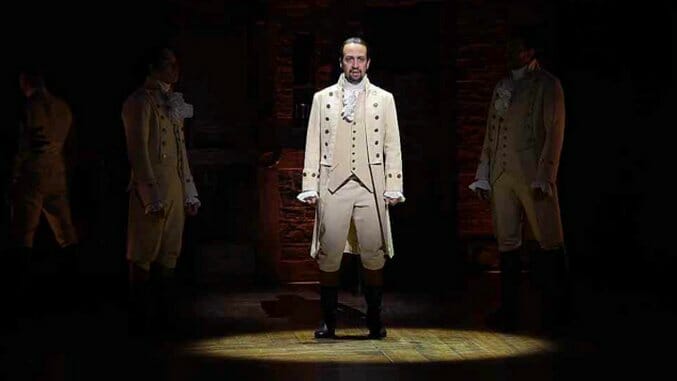Grace on Broadway: The Power of Hamilton
Photo by Theo Wargo / Getty
Last night I did the unimaginable. I bought a ticket to Hamilton for $13 above face value. I understand if your first reaction is one of seething hatred. Leave the random Thursday miracles to kids with cancer and not magazine editors who’ve already had several lifetime’s worth of memorable encounters with art. If it makes you feel better, I missed the first two songs while I followed the strange gentleman who materialized holding business cards like they were tickets into a nearby building to complete the purchase after the curtain had been raised. I felt no little relief when the ticket scanner waved me through to my first-row balcony seat.
I’m a casual theater-goer who’s seen maybe 10 shows on Broadway in my lifetime, but my obsession with the soundtrack to Lin-Manuel Miranda’s play is anything but casual. I’d initially dismissed the hype last year after listening to a few songs in the office while working and talking and not paying much attention. But I couldn’t ignore the growing chatter among friends who all of the sudden couldn’t be in the same room without steering every damned conversation back to a historical hip-hop musical—one they hadn’t even yet seen. Finally on a family road trip, I convinced my skeptical wife to give the album a listen. We thought our son was asleep in the back, but he’d woken up and was surprisingly engaged in the story. We got to our destination midway through the second act and they both made me start over on our way home.
That was in February, and a look at my Spotify history would show why I wake up each morning with a different Hamilton song stuck in my head. At least two of my three kids may be as obsessed as me, and my oldest daughter can rap all of “My Shot” with no accompaniment. The five of us are rarely this unanimous on a piece of music.
But there’s the soundtrack, and there’s the play. It set a record for Tony nominations this week with 16, and the biggest question is which featured actor will beat his castmates (my money is on Daveed Diggs, who is great on the album, but who simply takes over the stage in the second act with his physical manifestation of Thomas Jefferson). I’d come to know the music so well, I was almost caught off guard by the fact that I’d only been experiencing half of a whole. The songs that swell my emotions daily were doubly powerful on stage. It was funnier. Jonathan Groff was the only missing original cast member, but his replacement as King George, Rory O’Malley, brought so much more humor to the role than could possibly be translated to an audio file. And Phillipa Soo’s beatboxing during young Phillip Hamilton’s poetry recital is priceless.
-

-

-

-

-

-

-

-

-

-

-

-

-

-

-

-

-

-

-

-

-

-

-

-

-

-

-

-

-

-

-

-

-

-

-

-

-

-

-

-








































